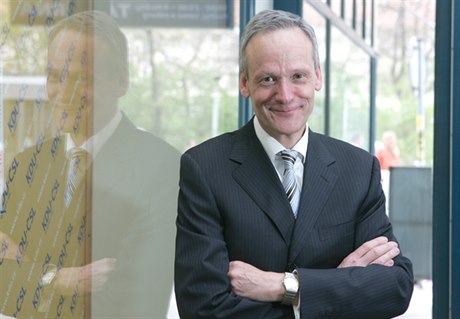Cyril Svoboda was twice chairman of the Christian Democrats (KDU-ČSL), a member of several Czech governments, and an important player with respect to the decades-long effort to restitute property and assets confiscated under communism to the churches. He was particularly prominent during the 2008 presidential election, when as party leader he had hoped that the Civic Democrats (ODS) would support the law on church restitution in exchange for KDU-ČSL backing Václav Klaus. But the rebellious ODS deputy Vlastimil Tlustý ultimately defeated the bill.
Since the party’s poor showing in the 2010 parliamentary elections, when the KDU-ČSL failed to win enough support to enter the lower house (Chamber of Deputies), Svoboda has spent much of his time teaching at various universities. Nevertheless, due to his many years as a lawmaker and involvement in the issue, he has much to say about church restitution. In an interview with Czech Position, he points to shortcomings in the government’s proposed settlement — and offers alternatives.
Svoboda doubts that the center-right coalition government — the ODS, TOP 09 and refugees from the Public Affairs (VV) party — will easily manage to get its draft church restitution bill approved in the lower house despite its slim majority; in the upper house, the Senate, the Social Democrats (ČSSD) can and will likely send it back. He cites the languishing agreement between the Czech Republic and the Holy See as proof of willful delays: “Parliament cannot even ratify the Czech-Vatican agreement, which is important for restitution. The fact that treaty has still not been ratified shows the political will is lacking,” he said. ‘The fact that the [Czech-Vatican] treaty has still not been ratified shows the political will is lacking.’
According to Svoboda, the Czech state has in fact been toying with the churches all along. “I don’t think they [the coalition government] ever wanted restitution. I see that as the biggest problem — because with restitution forever an open question it creates a situation wherein the churches are too loyal to the state. No one from the church knows from which party the ministers of culture and finance will be or which party will field the prime minister. So it’s a waiting game, with politicians telling the churches, ‘Just wait, you will get the treat called restitution. Don’t worry, we’ll sort it out.’ But it never happens,” Svoboda told Czech Position.
Self-financing of churches
According to the draft proposal put forth by the government of Prime Minister Petr Nečas (ODS), 17 churches and religious organizations, the Catholic Church being by far the largest among them, will receive financial compensation totaling Kč 59 billion over the next 30 years. “Let the state give restitution in kind, i.e. property. The churches no doubt have this right. However, they question the naive belief that the state will fully keep its pledge as regards financial compensation. It is presumptuous reliance on ‘divine providence.’ The 30 years over which it is meant to be paid out is such a long period that we can have no idea what will happen.”
It would be quite something else if the churches sold the claims to interests outside of the Czech Republic, he said: “For example, to the International Monetary Fund, which would in turn claim it from the state in some way.”
In lieu of financial compensation, according to the former KDU-ČSL chairman, there could also be a defined transition period of five to seven years, during which time the churches could learn to self-sufficient — in part by turning to believers for monetary support. “Even the Social Democrats could swallow that — a short transitional period before self-financing. It would be an elegant and fair solution,” he said.
However, the Czech Bishops’ Conference did not favor such a solution back in 2007 when he proposed it, Svoboda noted. “It met with a very negative reaction. They said I was proposing impoverishing the church. But I stressed that members of the church – myself included – have the primary responsibility for themselves,” he said. ‘[The] main benefactor is now the state, which sits in the front pew. And all the churches take great care not to upset the state.’
“When I offered my solution to the bishops some years ago, Archbishop Jan Graubner said that priests in their sermons had to cater to the biggest patron in the parish; it had no rights because the main benefactor is now the state, which sits in the front pew. And all the churches take great care not to upset the state,” Svoboda said.
He also fears that the Czech public will react negatively to the huge sum paid out to the churches as compensation. “When people learn that the church is getting the money, they will no longer be motivated to help. The churches must be internally consistent, and the congregations must rely on themselves,” Svoboda said.
And what about the farmers?
Some opponents to the property settlement claim that under the law, churches are a public entity and therefore restitution cannot apply — something that Svoboda regards as nonsense. “Already in 1990 a law was passed on the organization of certain relationships regarding ownership of monastic orders and congregations. The new democracy after 1989 recognized the church as a body capable of restitution,” Svoboda said.
The former Christian Democrat leader is concerned, however, that if ever passed by parliament, the church restitution law could still be struck down in the Constitutional Court. “The proposal will likely pass the lower house but will not be accepted wholly by the Senate. It could be returned to the house and every vote will count. If it passes the house again, there’s the Constitutional Court. If it comes to the principle of equality, as relates to compensation, it will be compared with, for example, whether the farmers [who had land taken by the communists] got such support,” Svoboda said. ‘Farmers did not get anything because a bunch of old Bolsheviks got into power in the cooperatives.’
According to the former foreign minister and interior minister, farmers are also entitled to compensation, though through cooperatives. “Farmers did not get anything because a bunch of old Bolsheviks got into power in the cooperatives, which took the sound properties and grouped them into companies [they founded]. The unusable assets – even at book value and in a sufficient quantity – were left in the cooperatives. Remaining, for example, were silage pits and abandoned pig farms. They then told those receiving restitution to sell them, saying ‘You will have the money as compensation.’ In accounting terms, maybe, but in fact they did not get a penny. These farmers justifiably feel cheated,” Svoboda said.
State should care for the churches
The Catholic Church was, according to Svoboda, in the time of communism a kind of moral compass for society; but when it began trying to resolve the issue of restitution, its voice notably waned — and this in a socially turbulent period. “As long as the church is economically dependent upon the state, logically, it will not do things that hinder it. I have not heard the Catholic Church say that the proposals of a minister are contrary to the teachings of the church,” he said.
If the church opposes some government action, Svoboda says, it is morally obligated to speak out. “The church is not playing such a role, which could win it public sympathy. The areas are many — pension reform, the social system, education and so on. Churches today are far too reticent,” he said. ‘I have not heard the Catholic Church say that the proposals of a minister are contrary to the teachings of the church.’
If the church did not have to care about maintaining the churches, it could strengthen its voice in society, and concentrate on spiritual matters, Svoboda said. “I would opt for the French solution – the repair of historical objects would be left to the state. Churches are important for the character of communities and regions. The public authority should be responsible for the churches; they are part of the architectural and historical heritage of the nation. And it’s all the same if four people or a hundred at believers are going to the church. Instead of the state, here the clergymen do it, but they have neither the time nor the strength to fulfill their primary mission, namely to work among the people.
Even now, according to Svoboda, the situation is such that restitution has a chance, but it is necessary to work out a compromise with the Social Democrats. “The ČSSD are heading toward a big victory in the next parliamentary elections. If in addition they help to solve this issue, they could get even greater numbers. It would show they are able to resolve a problem that is decidedly not their flagship issue, but that, unlike the conservatives can advise on it.


